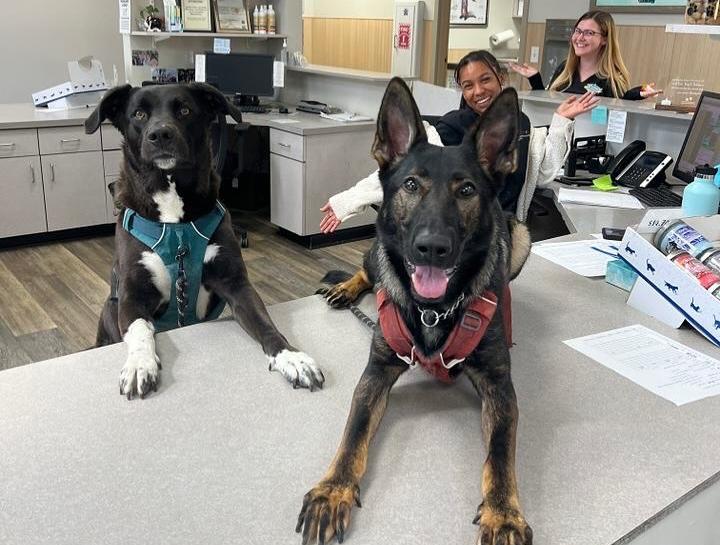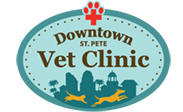Calm Care
Are you anxious about bringing your dog or cat to the vet? Are you afraid your pet will be stressed during its visit? We understand. Our goal is to remove or reduce, the anxiety you and your pet may feel. We call it Calm Care.
Why Calm Care is Important to Us
Like people, different pets have different tolerance for stressors—some feel anxiety more easily than others. Stress can arise when someone they are not very familiar with handles them for an exam. Or, they may need to receive a needle when vaccinations are due or when a test requires a blood sample.
On one hand, the stress level of some pets at the vet is “tolerable”. These patients will allow the doctor to perform exams and procedures with little to no evidence of anxiety or a stress response. On the other hand, the stress level of some pets can be more extreme. And unfortunately, we cannot explain to our patients the importance and benefit of checkups and preventive care.
Calm Care seeks to address these concerns with human virtues. It is a considered, compassionate approach to pet healthcare. The emotional (and physical) demands of a veterinary exam, treatment, or surgery can be high. But our team endeavors to lower them by…
- Helping owners prepare for the visit
- Creating a relaxed environment
- Following safety protocols and best practices
- Exuding positivity and gentleness
- Offering comfort and warmth
- Building trust and confidence
- Responding quickly to signs of anxiety
- Using tools and techniques designed for less-stress
- Catering to the individual needs of pets and owners
This list could go on to mention all the efforts we make to soothe and calm your pet. There is so much that goes on behind the scenes during your pet’s visit. Every “touch point” allows us an opportunity to demonstrate our loving, considerate approach to vet care.
How Calm Care Can Help
Reducing stress begins at home. Before your visit, we can offer advice to help you transport your pet to their visit, and back again. This is especially important in the transfer of cats and exotic pets to carriers, and pets who may not be accustomed to car travel.
Our friendly team members can make your pet’s experience a happy one. Positive reinforcement goes a long way to put your pet at ease.
With years of experience, our doctors and nurses can recognize signs of anxiety in pets through their body language. The team reacts quickly to help ensure your pet feels safe and in good hands. Animals rely on the way we touch them, talk to them, and move around them to gauge our intentions. We give careful thought to the way we approach these common actions.
Calm Care also includes being adaptable to your pet’s unique circumstances. Does your pet need pre-medication, alternative therapy, or special accommodation? We consider the individual needs of our patients to assess which techniques and protocols will help comfort your pet during their procedure. And as the owner, we want you to feel comfortable with your pet’s treatment too.
More About Pre-Medication
Our vets will discuss with you any concerns we have about your pet’s stress level at their visit to the clinic. We may recommend that your pet take an anxiety medication prior to future visits, and perhaps even reschedule the current visit.
You may wonder, “Why do they want to drug my pet? Do they think my pet is bad?” This is certainly not the case—excessive undue stress can have serious negative psychological and physical effects on your pet. These can include…
- Increased respiration
- Increased heart rate
- Increased blood pressure
- Delayed healing, or immune system suppression
- Increased memory consolidation
Pets can form lasting memories (memory consolidation) of a stressful event, which results in more severe anxiety in the future.
It is best to avoid and minimize anxiety before it becomes severe. Anxiety medications reduce the negative effects of stress. Pre-medication helps your pet to relax both physically and mentally, allowing for improved patient care long-term. Alternative therapies like pheromones, supplements, and certain training/desensitizing measures may also be advised in addition to medication.
There is no one-size-fits-all medication. Generally, your pet’s doctor will start with medication and dose he or she feels is appropriate for your pet, and then observe their response. The vet will adjust the dose or combination of medications as needed to help your pet’s time at the doctor be as stress-free as possible.
We hope Calm Care gives you—and your pet!—peace of mind.

